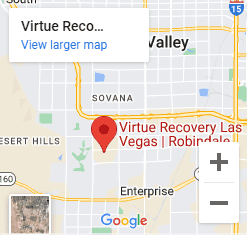Are you wondering what is a residential program? Residential treatment programs are designed to provide individuals with a safe and supportive environment to detox from addiction while getting the professional help they need for long-term recovery. Residential programs offer 24/7 care and support tailored to meet each individual’s needs. This type of program is beneficial for people who require more intensive or longer-term care than an outpatient program provides.
If you’re interested in a residential treatment program, contact 866.520.2861 to learn more about the residential treatment program at Virtue Recovery Las Vegas.
What Is a Residential Program?
A residential program is an addiction treatment or mental health program that provides 24-hour care and supervision in a secure, supportive environment. Residential programs provide various services designed to help individuals understand and address the underlying issues and behaviors that may have led them to abuse substances in the first place.
These services include individual therapy, group therapy, family therapy, educational workshops, relapse prevention skills training, aftercare planning, lifestyle change coaching, 12-step meetings, and other evidence-based therapies. Residential programs also provide medical assistance to help manage any withdrawal symptoms that may arise during detoxification.
Who Can Benefit From Residential Treatment?
Residential treatment can benefit anyone suffering from an addiction. Still, it may be best suited for individuals who require more intensive or longer-term care than an outpatient program can provide. Residential programs are especially helpful for those who:
- Have a severe or chronic substance use disorder
- Have tried less intensive treatment in the past and have not achieved lasting sobriety
- Need more structure, support, and supervision during the early stages of recovery
- Have a dual diagnosis or co-occurring mental health and substance use disorders
- Have experienced a relapse
- Are in an unsafe home environment or lack a family support system
- Are unable to access outpatient treatment due to work/school schedules or distance
At Virtue Recovery Las Vegas, we understand that everyone’s recovery journey is unique and requires personalized attention and care. That’s why our residential program provides a comprehensive range of services to meet the needs of each individual in treatment. From detox to outpatient programs, we provide substance use disorder treatment to the Las Vegas area and beyond.
Benefits of a Residential Treatment Program
A residential treatment program provides numerous additional benefits to help those suffering from addiction create a strong foundation for recovery. Here are some key benefits of residential treatment:
- Access to a supportive environment that focuses on healing – Residential programs provide an environment where all members are devoted to reaching sobriety and creating positive change in their lives.
- Experienced staff with expertise in treating substance use disorder – The team at residential treatment centers are highly trained professionals who specialize in treating SUDs and understand the complexities involved in navigating through the stages of recovery physically and emotionally.
- Structure and accountability – Residential programs provide a structure essential for long-term success as it helps individuals stay focused on their goals while providing accountability for staying on track with their recovery journey.
- Opportunity for self-reflection – Being away from the distractions of everyday life gives individuals more time and space to focus on themselves, allowing them space to reflect on their thoughts, feelings, and beliefs about themselves and others around them while gaining valuable insight into how these thought patterns affect their behavior.
- Long-term support and aftercare planning – Residential programs provide individuals with the support they need to remain sober and healthy after completing treatment. This includes relapse prevention skills, lifestyle change coaching, aftercare plans, and other resources needed for long-term success.
Residential treatment can be a transformative experience. With the proper care, guidance, and support, individuals can better understand themselves and create lasting positive change in their lives.
Contact Virtue Las Vegas – Substance Use Disorders for Residential Treatment
At Virtue Recovery Las Vegas, we offer residential treatment programs tailored to meet the unique needs of each individual. Our compassionate staff is dedicated to providing guidance and support throughout the recovery process.
Please contact us today at 866.520.2861 or fill out our online form if you or someone you love needs residential treatment. We’d like to help you get on the path to recovery as soon as you’re ready.














